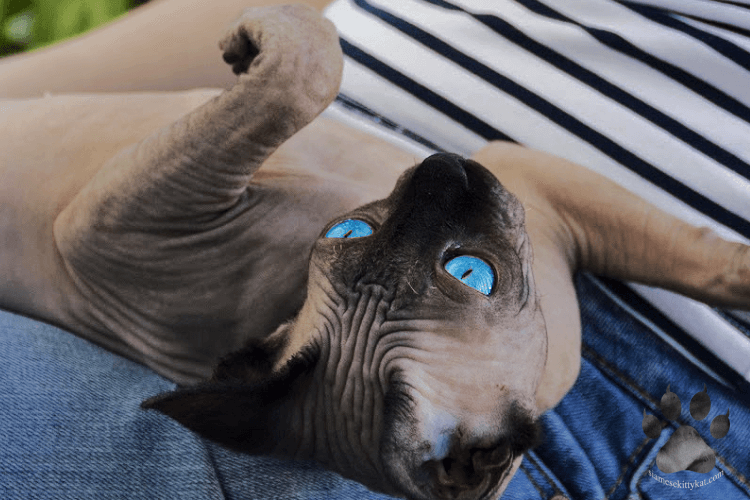Purebred Siamese cats cannot be hairless. They do not carry the gene mutation that causes hairlessness.
However, there is a breed of hairless cats called the Donskoy, which has Siamese ancestry. The Donskoy breed was from selective breeding of a hairless cat, a Siamese, and a Scottish Fold.
Not all cats can be hairless. The gene responsible for hairlessness is only in certain breeds, like the Sphynx. Siamese cats generally do not carry the hairlessness gene. It would be challenging for them to produce hairless kittens.
My friend Alana brought her hairless cat, Loki the Peterbald, to our weekly gathering. The cat was hairless and had skin that resembled soft leather. Loki had a calm and gentle personality. Loki’s big, round eyes gave me the impression that he was looking right through me.
I admire the unique beauty of hairless cats, but I still prefer Siamese cats. I have two Siamese cats now, Batman and Robyn, whom I love for their beauty and playful personalities.
This post will explain why Siamese cats cannot be hairless. We’ll also explore feline genetics and why some cats are hairless. Plus, let’s see if hairless cats are hypoallergenic.
Can A Hairless Cat Be Half Siamese?
A hairless cat can be half Siamese. The genes that determine fur and hairlessness differ from those that determine breed.
Breeders have developed hairless cat breeds, like the Peterbald, through selective breeding. Breeders can cross these hairless breeds with other breeds, including the Siamese.
Can Siamese Cats Be Hairless?
Siamese cats cannot be hairless because it disrupts their thermoregulatory system. Being hairless could put their health at risk.
Caring for their fur is crucial to their health. Their fur is essential for protecting their skin from harmful rays. Removing their fur could cause skin damage and increase the risk of skin cancer.
Siamese cats cannot be hairless because of their unique biological makeup.
Their fine coat is essential to their survival. Their fur helps them maintain their body temperature in hot and cold environments.
Siamese cats cannot be hairless due to their biological need for temperature regulation.
They need their fur to keep and release heat from their body. They need fur to help regulate their bodies. They will develop hypothermia or heat strokes if they are hairless.
How Do Hairless Cats Stay Warm?
Hairless cats do not rely on their fine layer of hair for insulation. They have a particular layer that does the job.
Hairless cats rely on their subcutaneous fat and metabolism to stay warm. They can generate more heat internally because they have a high metabolism.
Hairless cats have a metabolism that’s 12% faster than furred cats. They burn calories quicker than their furry counterparts.
What’s more astonishing is that they have higher body temperatures than furred cats. Hairless cats have an average body temperature of around 38 to 39 degrees Celsius. This is why they tend to have a more slender physique.
Do Hairless Cats Shed At All?

Hairless cats do shed. The shedding is less extensive since they don’t have a full coat.
Their shedding is less noticeable than cats with fur. They have a fine layer of hair that’s nearly invisible. The hair can fall out anytime, like any other cat’s fur.
Did you know that hairless cats need more frequent baths than cats with fur? This is because oils can build up on their sensitive skin. The oil build-up can cause skin irritation if you do not bathe them regularly.
Do Hairless Cats Need Special Grooming?
Hairless cats need more attention and care when it comes to grooming. They need frequent baths, ear cleaning, and nail trims. Their skin is sensitive. You must use gentle and mild products to prevent allergies and irritation.
Hairless cats can get acne and other skin problems if not cleaned regularly. Some owners take their hairless kitties to pro groomers to ensure their cats get the proper care.
Are Hairless Cats Rare?
Hairless cats are not that rare. They are just less common than cats with fur in some countries.
They have surprisingly lovable personalities. Their unique appearance also made them famous in recent years. They are even now becoming more appreciated as house companions.
Some deter away from having hairless cats at home because these cats are high maintenance.
Hairless cats are only a good fit for those willing to care for them and invest much in their upkeep. These cats need special care due to their lack of fur.
Are Hairless Cats Hard To Find?
Hairless cats are not necessarily hard to find. You can easily find some breeds of hairless cats in many countries. They are the Sphynx, Peterbald, and Donskoy breeds.
Others are difficult to find, since specialized breeders only breed them. The Bambino and Ukrainian Levkoy are a few hairless cat breeds that are hard to find in some countries.
Are Hairless Cats More Prone To Health Problems?

Hairless cats can be prone to some health problems. Not all hairless cats will necessarily experience these health issues. They can avoid these issues with proper care and attention.
These are the potential health issues that hairless cats may be more prone to:
1. Hypertrophic cardiomyopathy
Hairless cats are prone to developing hypertrophic cardiomyopathy. These cats have a gene linked to hypertrophic cardiomyopathy.
This heart disease causes the walls of a cat’s heart to thicken. This makes it difficult for the cat’s heart to pump blood.
Owners of hairless cats should bring them to the vet for regular screening. The screening will involve an ultrasound of the cat’s heart.
2. Skin problems
Hairless cats are likely to have skin problems. Their skin is sensitive. They are more prone to skin problems than furred cats. Dirt can also quickly build up on their skin.
Their skin can become swollen, flaky, or irritated if not appropriately handled.
Hairless cats can get acne, sunburn, and rashes if you don’t bathe them weekly. Regular bathing is essential for maintaining the health of their skin.
3. Dental problems
Did you know that hairless cats have fewer and more crowded teeth than other cats? They are likely to develop dental problems because of this.
Hairless cats are prone to gum disease and tooth decay. They need regular dental check-ups and cleanings to address any issues early on.
Are Hairless Cats Hypoallergenic?
Hairless cats are not hypoallergenic. They can still produce the protein Fel d 1, which is the culprit for creating allergic reactions. They spread this protein all over their body whenever they groom themselves. The protein can become airborne and cause allergic reactions in a few people.
Hairless cats can quickly spread the protein because they lack enough fur to trap it. Bathing them every week can help reduce the spread of this protein.
We gathered all the health tips tailored toward maintaining your Siamese cat’s optimal well-being. Check it out here: Siamese Cat Health: A Complete Guide
